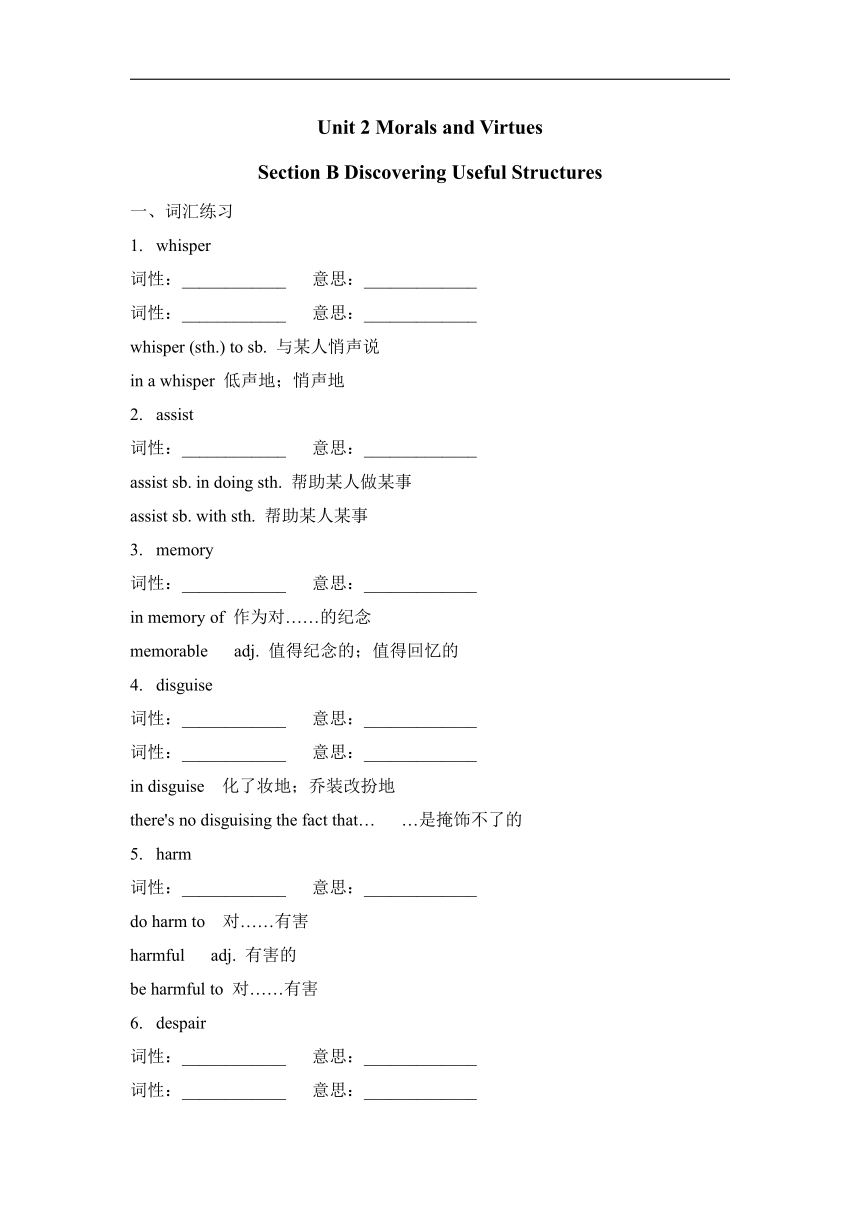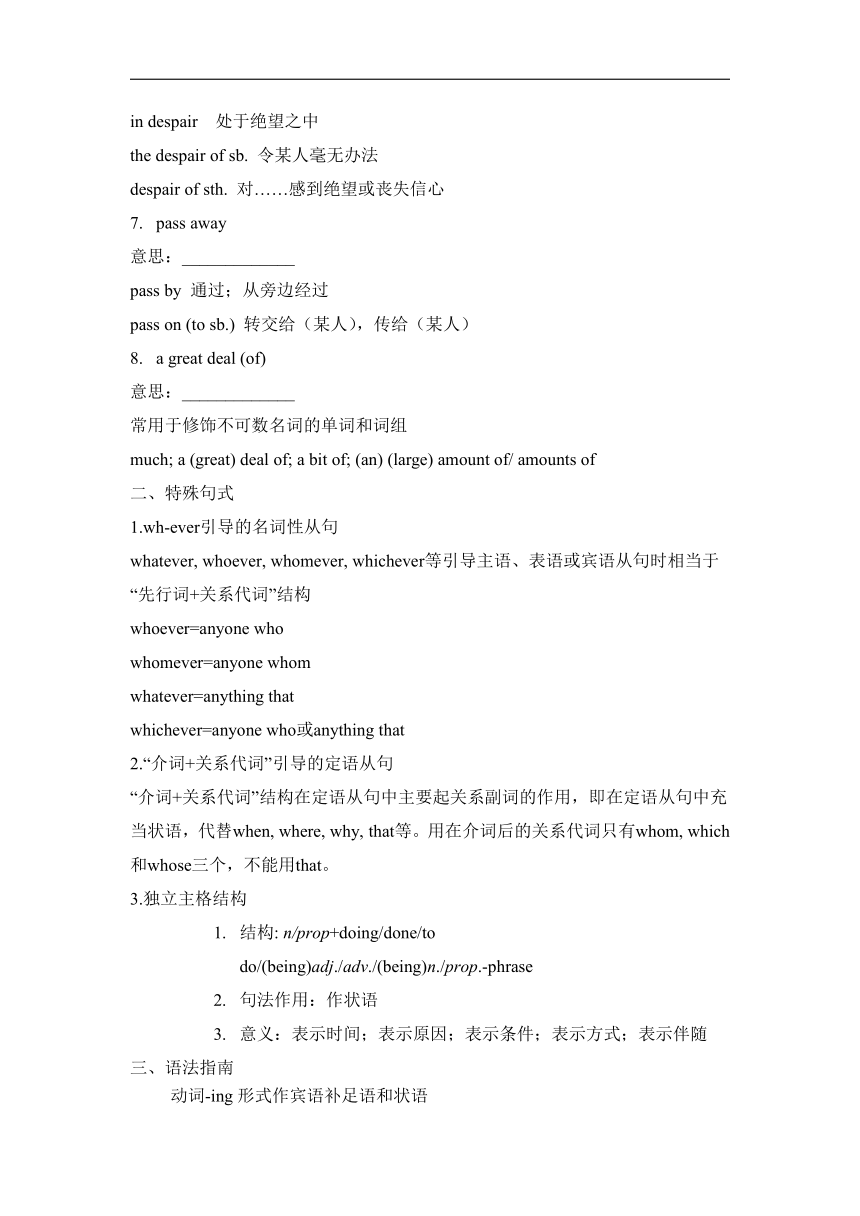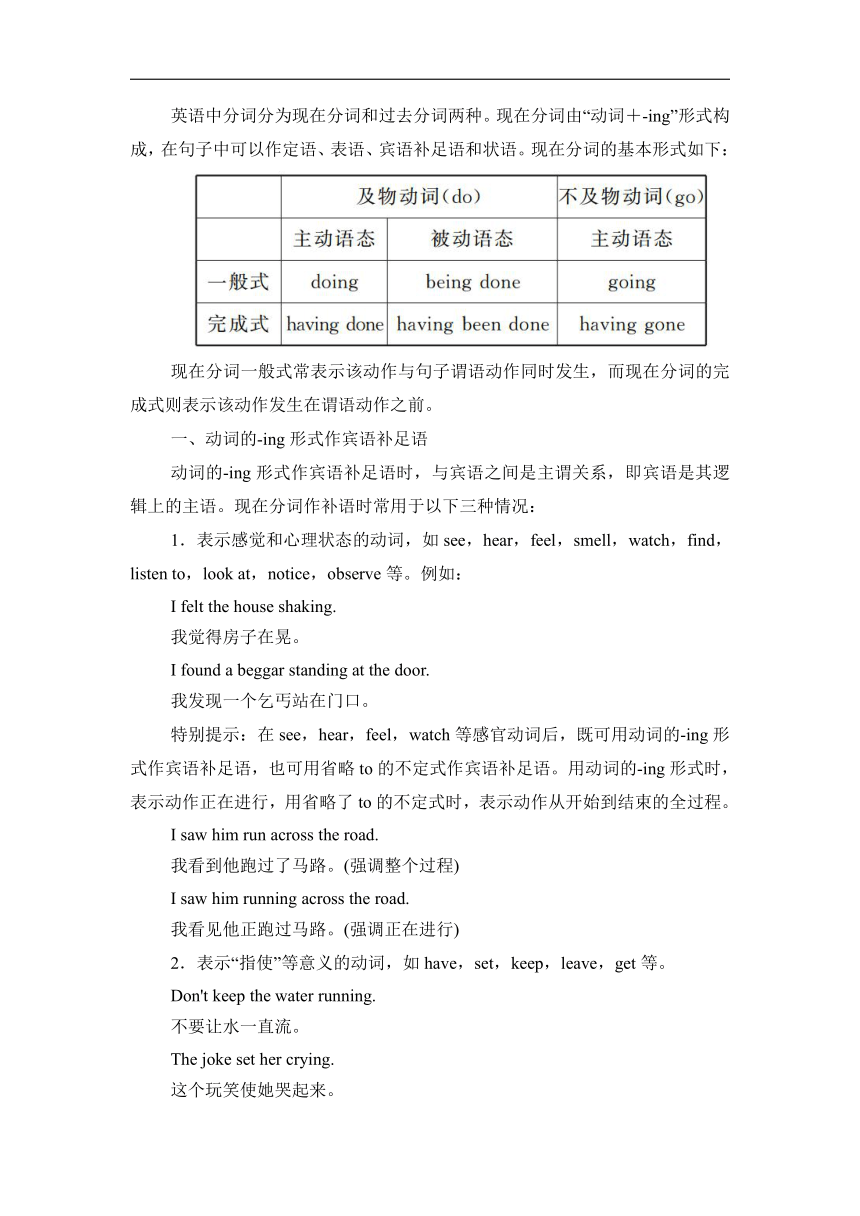人教版(2019)必修第三册Unit 2 Morals and Virtues Discovering Useful Structures 学案(含答案)
文档属性
| 名称 | 人教版(2019)必修第三册Unit 2 Morals and Virtues Discovering Useful Structures 学案(含答案) |  | |
| 格式 | docx | ||
| 文件大小 | 53.7KB | ||
| 资源类型 | 教案 | ||
| 版本资源 | 人教版(2019) | ||
| 科目 | 英语 | ||
| 更新时间 | 2022-12-28 20:46:37 | ||
图片预览



文档简介
Unit 2 Morals and Virtues
Section B Discovering Useful Structures
一、词汇练习
whisper
词性:____________ 意思:_____________
词性:____________ 意思:_____________
whisper (sth.) to sb. 与某人悄声说
in a whisper 低声地;悄声地
assist
词性:____________ 意思:_____________
assist sb. in doing sth. 帮助某人做某事
assist sb. with sth. 帮助某人某事
memory
词性:____________ 意思:_____________
in memory of 作为对……的纪念
memorable adj. 值得纪念的;值得回忆的
disguise
词性:____________ 意思:_____________
词性:____________ 意思:_____________
in disguise 化了妆地;乔装改扮地
there's no disguising the fact that… …是掩饰不了的
harm
词性:____________ 意思:_____________
do harm to 对……有害
harmful adj. 有害的
be harmful to 对……有害
despair
词性:____________ 意思:_____________
词性:____________ 意思:_____________
in despair 处于绝望之中
the despair of sb. 令某人毫无办法
despair of sth. 对……感到绝望或丧失信心
pass away
意思:_____________
pass by 通过;从旁边经过
pass on (to sb.) 转交给(某人),传给(某人)
a great deal (of)
意思:_____________
常用于修饰不可数名词的单词和词组
much; a (great) deal of; a bit of; (an) (large) amount of/ amounts of
二、特殊句式
1.wh-ever引导的名词性从句
whatever, whoever, whomever, whichever等引导主语、表语或宾语从句时相当于“先行词+关系代词”结构
whoever=anyone who
whomever=anyone whom
whatever=anything that
whichever=anyone who或anything that
2.“介词+关系代词”引导的定语从句
“介词+关系代词”结构在定语从句中主要起关系副词的作用,即在定语从句中充当状语,代替when, where, why, that等。用在介词后的关系代词只有whom, which和whose三个,不能用that。
3.独立主格结构
结构: n/prop+doing/done/to do/(being)adj./adv./(being)n./prop.-phrase
句法作用:作状语
意义:表示时间;表示原因;表示条件;表示方式;表示伴随
三、语法指南
动词 ing形式作宾语补足语和状语
英语中分词分为现在分词和过去分词两种。现在分词由“动词+ ing”形式构成,在句子中可以作定语、表语、宾语补足语和状语。现在分词的基本形式如下:
现在分词一般式常表示该动作与句子谓语动作同时发生,而现在分词的完成式则表示该动作发生在谓语动作之前。
一、动词的 ing形式作宾语补足语
动词的 ing形式作宾语补足语时,与宾语之间是主谓关系,即宾语是其逻辑上的主语。现在分词作补语时常用于以下三种情况:
1.表示感觉和心理状态的动词,如see,hear,feel,smell,watch,find,listen to,look at,notice,observe等。例如:
I felt the house shaking.
我觉得房子在晃。
I found a beggar standing at the door.
我发现一个乞丐站在门口。
特别提示:在see,hear,feel,watch等感官动词后,既可用动词的 ing形式作宾语补足语,也可用省略to的不定式作宾语补足语。用动词的 ing形式时,表示动作正在进行,用省略了to的不定式时,表示动作从开始到结束的全过程。
I saw him run across the road.
我看到他跑过了马路。(强调整个过程)
I saw him running across the road.
我看见他正跑过马路。(强调正在进行)
2.表示“指使”等意义的动词,如have,set,keep,leave,get等。
Don't keep the water running.
不要让水一直流。
The joke set her crying.
这个玩笑使她哭起来。
3.用于with复合结构中。如:
I couldn't do my homework with the noise going on.
由于噪音不断,我没法做家庭作业。
With so many people looking at her,she felt nervous.
这么多人看着她,她感到很紧张。
二、现在分词作状语
现在分词作状语时,可以表示时间、原因、结果、条件、方式或伴随动作。通常可转化成与之相对应的状语从句。
1.作时间状语
Walking in the park,she saw an old friend.
=When/While (she was) walking in the park,she saw an old friend.
当她在公园里散步时,她看到了她的一个老朋友。
Having finished the work,he went to see his teacher.
=After he had finished the work,he went to see his teacher.
完成这次工作后,他去看望他的老师。
特别提示:当表达正在进行的动作时,可直接在分词前面加when/while,此时也可理解为状语从句的省略。
2.作原因状语
Being ill,he couldn't go to school.
=As he was ill,he couldn't go to school.
因为生病了,他无法去上学。
3.作条件状语
Working hard,you'll make great progress.
=If you work hard,you'll make great progress.
如果你努力工作,你将取得重大进步。
4.作结果状语
His parents died,leaving him an orphan.
=His parents died and left him an orphan.
他的父母死了,他成了一个孤儿。
The snow lasted a week,resulting in a serious traffic confusion in the whole area.
=The snow lasted a week,and resulted in a serious traffic confusion in the whole area.
大雪持续了一周,结果造成了这一地区的严重的交通混乱。
5.作方式状语
He came running back to tell me the news.
他跑回来告诉我这个消息。
6.作伴随状语
I stood by the door,not daring to say a word.
=I stood by the door,and didn't dare to say a word.
我站在门旁,一句话也不敢说。
She walked along the street,singing softly to herself.
=She walked along the street and sang softly to herself.
她沿着街道一边走一边轻轻地唱。
7.作让步状语
Working or reading,she always did her best.
=Whether she worked or read,she always did her best.
无论工作还是读书,她总是尽最大的努力。
Working very hard,he didn't feel a bit tired.
=Though he worked hard,he didn't feel a bit tired.
尽管拼命地工作,他却丝毫不感到疲惫。
四、同步练习
1.Weather _________(permit), we'll go for a picnic the day after tomorrow.
2.My cousin came to see me from the country, _________ (bring) me a full basket of fresh fruits.
3.While _________ (watch) TV, we heard the doorbell ring.
4._________ (not know) her address, we couldn't get in touch with her.
5.He sat at the desk, _________ (read) a newspaper.
6._________(open) the window, you will see the garden below.
7.______________(complete) his homework,Tom went out to play for a while.
8.我下车的时候注意到一个男人匆匆忙忙地从银行里跑出来。
I noticed a man __________________________ when I got off the car.
9.由于不知道她的地址,我没法给她写信。
________ ________ ________ ________, I can't write to her.
10.杰克完成作业后,外出散步。
________ ________ ________ _______, Jack went out for a walk.
11.听到这个消息我们都高兴得跳了起来。
________ ________ ________ , we all jumped with joy.
12.过马路的时候要小心些。
When ________ ________ ________, please be careful.
13.从山上看,我们发现那个湖泊更加漂亮了。
________ ________ ________ ________ ________ , we find that the lake looks more beautiful.
答案以及解析
1.答案:permitting
2.答案:bringing
3.答案:watching
4.答案:Not knowing
5.答案:reading
6.答案:Opening
7.答案:completed
8.答案:running out of the bank
9.答案:Not knowing her address
10.答案:Having finished his homework
11.答案:Hearing the news
12.答案:crossing the road
13.答案:Seeing it from the hill
Section B Discovering Useful Structures
一、词汇练习
whisper
词性:____________ 意思:_____________
词性:____________ 意思:_____________
whisper (sth.) to sb. 与某人悄声说
in a whisper 低声地;悄声地
assist
词性:____________ 意思:_____________
assist sb. in doing sth. 帮助某人做某事
assist sb. with sth. 帮助某人某事
memory
词性:____________ 意思:_____________
in memory of 作为对……的纪念
memorable adj. 值得纪念的;值得回忆的
disguise
词性:____________ 意思:_____________
词性:____________ 意思:_____________
in disguise 化了妆地;乔装改扮地
there's no disguising the fact that… …是掩饰不了的
harm
词性:____________ 意思:_____________
do harm to 对……有害
harmful adj. 有害的
be harmful to 对……有害
despair
词性:____________ 意思:_____________
词性:____________ 意思:_____________
in despair 处于绝望之中
the despair of sb. 令某人毫无办法
despair of sth. 对……感到绝望或丧失信心
pass away
意思:_____________
pass by 通过;从旁边经过
pass on (to sb.) 转交给(某人),传给(某人)
a great deal (of)
意思:_____________
常用于修饰不可数名词的单词和词组
much; a (great) deal of; a bit of; (an) (large) amount of/ amounts of
二、特殊句式
1.wh-ever引导的名词性从句
whatever, whoever, whomever, whichever等引导主语、表语或宾语从句时相当于“先行词+关系代词”结构
whoever=anyone who
whomever=anyone whom
whatever=anything that
whichever=anyone who或anything that
2.“介词+关系代词”引导的定语从句
“介词+关系代词”结构在定语从句中主要起关系副词的作用,即在定语从句中充当状语,代替when, where, why, that等。用在介词后的关系代词只有whom, which和whose三个,不能用that。
3.独立主格结构
结构: n/prop+doing/done/to do/(being)adj./adv./(being)n./prop.-phrase
句法作用:作状语
意义:表示时间;表示原因;表示条件;表示方式;表示伴随
三、语法指南
动词 ing形式作宾语补足语和状语
英语中分词分为现在分词和过去分词两种。现在分词由“动词+ ing”形式构成,在句子中可以作定语、表语、宾语补足语和状语。现在分词的基本形式如下:
现在分词一般式常表示该动作与句子谓语动作同时发生,而现在分词的完成式则表示该动作发生在谓语动作之前。
一、动词的 ing形式作宾语补足语
动词的 ing形式作宾语补足语时,与宾语之间是主谓关系,即宾语是其逻辑上的主语。现在分词作补语时常用于以下三种情况:
1.表示感觉和心理状态的动词,如see,hear,feel,smell,watch,find,listen to,look at,notice,observe等。例如:
I felt the house shaking.
我觉得房子在晃。
I found a beggar standing at the door.
我发现一个乞丐站在门口。
特别提示:在see,hear,feel,watch等感官动词后,既可用动词的 ing形式作宾语补足语,也可用省略to的不定式作宾语补足语。用动词的 ing形式时,表示动作正在进行,用省略了to的不定式时,表示动作从开始到结束的全过程。
I saw him run across the road.
我看到他跑过了马路。(强调整个过程)
I saw him running across the road.
我看见他正跑过马路。(强调正在进行)
2.表示“指使”等意义的动词,如have,set,keep,leave,get等。
Don't keep the water running.
不要让水一直流。
The joke set her crying.
这个玩笑使她哭起来。
3.用于with复合结构中。如:
I couldn't do my homework with the noise going on.
由于噪音不断,我没法做家庭作业。
With so many people looking at her,she felt nervous.
这么多人看着她,她感到很紧张。
二、现在分词作状语
现在分词作状语时,可以表示时间、原因、结果、条件、方式或伴随动作。通常可转化成与之相对应的状语从句。
1.作时间状语
Walking in the park,she saw an old friend.
=When/While (she was) walking in the park,she saw an old friend.
当她在公园里散步时,她看到了她的一个老朋友。
Having finished the work,he went to see his teacher.
=After he had finished the work,he went to see his teacher.
完成这次工作后,他去看望他的老师。
特别提示:当表达正在进行的动作时,可直接在分词前面加when/while,此时也可理解为状语从句的省略。
2.作原因状语
Being ill,he couldn't go to school.
=As he was ill,he couldn't go to school.
因为生病了,他无法去上学。
3.作条件状语
Working hard,you'll make great progress.
=If you work hard,you'll make great progress.
如果你努力工作,你将取得重大进步。
4.作结果状语
His parents died,leaving him an orphan.
=His parents died and left him an orphan.
他的父母死了,他成了一个孤儿。
The snow lasted a week,resulting in a serious traffic confusion in the whole area.
=The snow lasted a week,and resulted in a serious traffic confusion in the whole area.
大雪持续了一周,结果造成了这一地区的严重的交通混乱。
5.作方式状语
He came running back to tell me the news.
他跑回来告诉我这个消息。
6.作伴随状语
I stood by the door,not daring to say a word.
=I stood by the door,and didn't dare to say a word.
我站在门旁,一句话也不敢说。
She walked along the street,singing softly to herself.
=She walked along the street and sang softly to herself.
她沿着街道一边走一边轻轻地唱。
7.作让步状语
Working or reading,she always did her best.
=Whether she worked or read,she always did her best.
无论工作还是读书,她总是尽最大的努力。
Working very hard,he didn't feel a bit tired.
=Though he worked hard,he didn't feel a bit tired.
尽管拼命地工作,他却丝毫不感到疲惫。
四、同步练习
1.Weather _________(permit), we'll go for a picnic the day after tomorrow.
2.My cousin came to see me from the country, _________ (bring) me a full basket of fresh fruits.
3.While _________ (watch) TV, we heard the doorbell ring.
4._________ (not know) her address, we couldn't get in touch with her.
5.He sat at the desk, _________ (read) a newspaper.
6._________(open) the window, you will see the garden below.
7.______________(complete) his homework,Tom went out to play for a while.
8.我下车的时候注意到一个男人匆匆忙忙地从银行里跑出来。
I noticed a man __________________________ when I got off the car.
9.由于不知道她的地址,我没法给她写信。
________ ________ ________ ________, I can't write to her.
10.杰克完成作业后,外出散步。
________ ________ ________ _______, Jack went out for a walk.
11.听到这个消息我们都高兴得跳了起来。
________ ________ ________ , we all jumped with joy.
12.过马路的时候要小心些。
When ________ ________ ________, please be careful.
13.从山上看,我们发现那个湖泊更加漂亮了。
________ ________ ________ ________ ________ , we find that the lake looks more beautiful.
答案以及解析
1.答案:permitting
2.答案:bringing
3.答案:watching
4.答案:Not knowing
5.答案:reading
6.答案:Opening
7.答案:completed
8.答案:running out of the bank
9.答案:Not knowing her address
10.答案:Having finished his homework
11.答案:Hearing the news
12.答案:crossing the road
13.答案:Seeing it from the hill
